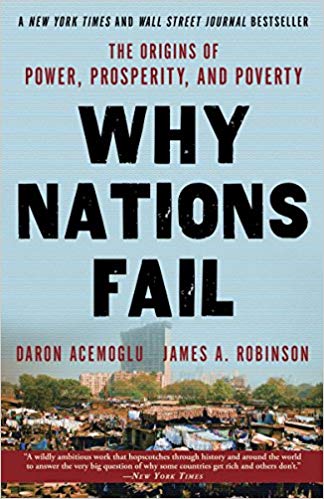Why Nations Fail Audiobook by Daron Acemoglu and James A. Robinson
Why Nations Fail Audiobook by Daron Acemoglu and James A. Robinson: The Origins of Power, Prosperity, and Poverty

text
The scholarly job of Daron Acemoglu and James Robinson is currently commonly recognized amongst financial historians, economic experts as well as political scientists. In Why Nations Fail Acemoglu and Robinson seek to share to a much more comprehensive target market the results of several years’ path-breaking study on the historic role of establishments– specified as “the policies affecting exactly how the economy works, and also the rewards that motivate people”– and their influence (p. 73). The outcome is a very understandable job of huge geographical and also chronological array that resolves one of the most important concerns of the modern world. Why Nations Fail Audiobook Online. With much of its web content including great, antique historic narrative– something I did not quite expect.
The standard situation that the writers look for to make in the book is a straightforward one, specifically that countries with extractive political and also financial organizations are most likely to be inadequate, whereas those with comprehensive organizations are most likely to be abundant. Politics is vital: the existence of centralised as well as pluralistic political institutions is the crucial to the continual existence of comprehensive financial establishments. While a degree of economic development might be feasible under extractive institutions, such development is not sustainable, as shown by the cases of, as an example, the later Roman Realm or the Soviet Union. As soon as a nation has actually begun to move towards comprehensive establishments a positive comments loophole might assist to maintain them in place, but extractive institutions are also received by path reliance, with those in power scared of the “creative destruction” created by adjustment, creating a vicious circle. The debate put forward is not, nonetheless, among institutional determinism. Tiny institutional differences, as well as what the authors describe as “institutional drift” over time can connect with “critical junctures” and also historic backup to generate a change in path. By analysing such institutional evolution in its historic setting, Acemoglu and Robinson say that we can much better recognize why some countries are abundant as well as others poor, how that pattern might have changed gradually, as well as also exactly how the trouble of worldwide inequality may be attended to in the future.
Striking historic examples are utilized to demonstrate the key importance of institutions, as well as to reject the explanatory power of geography as well as society. The two Koreas, united until the late 1940s, as well as sharing an usual location as well as culture, have considering that diverged considerably in institutional and wealth terms. Exploitative Spanish imperialists searching for plunder put Latin America on a course of extractive and ineffective organizations, while the exact same establishments stopped working to operate in North America, permitting the appearance of democracy and institutions extra for growth. Instance confirmed? Well, as much as a factor. It is absolutely hard to dispute the insurance claim that “establishments matter”, and also the authors themselves have actually played a significant role in showing the importance of colonial organizations, for example, in shaping the economic growth of colonised nations, and also in the primacy of political establishments fit financial ones. Few scholastic readers will differ with the standard message of this important book. Why Nations Fail Audiobook Download. What several visitors will certainly be much less comfy with, maybe, is the oversimplification certainly connected with practically any kind of monocausal explanation, and also the wholesale being rejected of other competing explanations of historical advancement. To be fair, the writers in the conclusion acknowledge the constraints of their technique, however their overstated representation of the determinism associated with geographical or social explanations, for instance, avoids them from recognizing the refined historical interplay between geographical factors, society (nevertheless that could be specified) as well as institutions, whether extractive or inclusive. For instance, the writers’ own account shows that a significant reason that the extractive organizations of the Spanish can not be duplicated in The United States and Canada was the extremely lack of treasures (silver and gold) that could be plundered. Acemoglu and Robinson have likewise in the past been criticised for “pressing” background, and also their theory elevates major questions regarding what amount of time issue in institutional terms. The extractive Mayan Empire, for example, continued to generate wide range over greater than six centuries.
Acemoglu and Robinson beware to emphasize the significance of historical backup in their interpretation; institutional dynamics react to critical junctures and brand-new possibilities. In that context one of the important things that comes out of their account is the recurrent value of chance and good luck, as well as also the significance of specific actors, rather reminiscent of the ‘fantastic guys’ analyses of history so popular in the 19th and very early 20th centuries. Botswana, for instance, was greatly privileged to have as its leader Seretse Khama, that sustained the relocation towards more comprehensive organizations, unlike Robert Mugabe in Zimbabwe or Mobutu in the Congo. Their historic account is hence occupied with a rich cast of heroes and also bad guys of all tones. Not remarkably for those knowledgeable about their job, imperialism is just one of the major offenders, however much from the just one. These, as well as various other somewhat black and white depictions, will certainly do much to offer Why Nations Fail, yet they will certainly also contribute to the book’s exciting strong sights, specifically in its absence of nuancing. Why Nations Fail Audiobook (streaming). There is as a result much to compliment about this publication, and a lot to disagree with, yet also its critics will yield that it is based on significant scholarship, will do much to boost dispute, and also is an excellent read.